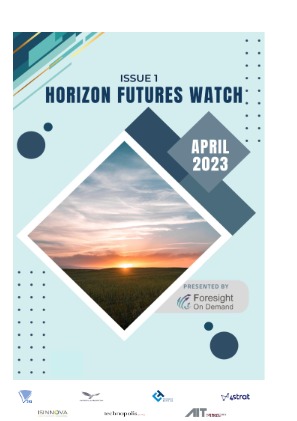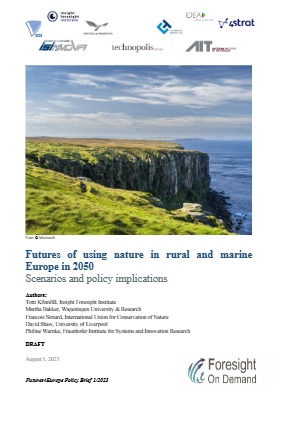This is the summary of the dissemination event held for the 'Futures of using nature in rural and marine Europe in 2050' project.
The 14th of June marked the second Deep Dives Dissemination Workshop, focusing on the future of land and sea use. The workshop started with the presentation of The Deep Dive report on Rural and Marine areas in Europe. The report approached the topic from the perspective of using land and sea for restoring biodiversity, involving issues of governance and ownership of land, as well as access and use rights. Four dimensions were used as the basis for scenarios: the economic model, focusing on growth and global trade versus a self-sufficient Europe; environment and production, showing, on one extreme, Europe undertaking intensive mass production of food and a regenerative multifunctional production on the other; low versus high trust in society; and an autocratic versus a deliberative governance model.
Amongst the 16 different possible futures along these dimensions, four alternative scenarios were developed:
European civic eco-village: Based on a post-growth and autonomous Europe, much of the food chains are local and short, featuring many cooperative practices. There is a strong focus on nature rights and care for the environment.
Sustainable high-tech Europe in the World Trade: With a strong focus on regenerative production, honing a high trust society but a weak democracy, the EU no longer exists and is replaced by strong local leaders that re-establish the trust of the people in the local level. On a greater scale, the UN regulates global trade instead of the EU. The management of rural, coastal and marine areas is aligned with national plans and Europe is well aligned with the rest of the world.
United States of Europe: This growth scenario for global trade centers around mass and intensive food production processes with weak democracy and high trust. Furthermore, there is a need for unified autocratic decision-making. Europe is a powerful global player in terms of global trade and its sustainability agenda.
European permacrisis: This scenario paints a picture of a post-growth, autonomous Europe, reminiscent of the first scenario but with a twist: it's marked by intensive mass food production. The political landscape is fragmented, dominated by niche single-issue protest parties. Innovation stagnates, and the legal framework suffers from low quality and poor execution. Corporate giants hold significant sway over decisions. Coordination in land use is scant, making nature conservation zones a rare sight. This environment breeds intense competition, making scalability a challenging endeavor.
The scenarios’ implications for policy
When it comes to the policy dimension, the scenarios have interconnected effects on various areas like energy, transportation, farming, and fishing. The scenarios highlight a strong focus on making gradual improvements that support a diverse approach to utilising both land and sea resources. These gradual improvements to both land and sea resources usage were further discusssed in the subsequent presentations of the IFOAM and FLOW initiatives, which both aim to enhance production systems and the integrity of supply chain or one’s relationship to ocean and water and coastal resources.
When we shift our gaze to demographics, lifestyles, and values, the narrative centers around bolstering civic resilience and readiness. This is particularly poignant for rural regions, which need to diversify and foster shared practices that bridge the urban-rural divide. On the governance front, the discourse underscores the pivotal role of citizen engagement in decision-making processes. It also spotlights the intertwined nature of societal and economic resilience, drawing attention to the harmonious relationship between nature restoration and economic activities. The MOVING project resonated vividly with these principles, as it seeks to strengthen value chains that enhance the resilience and sustainability of mountain regions in the face of climate change and other drivers. It was also exhibited in a later part of the workshop as a real case example of how innovative approaches can be practically applied to address pressing environmental challenges, demonstrating the tangible impact of aligning principles with action in safeguarding vulnerable ecosystems.
Another related point was raised about the importance of the interaction between land and sea, as marine special planning is a comprehensive approach to managing human activities in marine and coastal areas. It is about balancing competing demands while preserving the ecological integrity of marine ecosystems.
As discussions unfolded, apprehensions arose regarding the "United States of Europe" scenario, particularly its emphasis on autocratic decision-making. Many participants felt that, given Europe's historical and cultural backdrop, autocracy seemed improbable. Instead, they pinpointed misinformation and the misuse of social media as the most pressing threats to modern democracy. In their perspective, a more plausible scenario would be a fragile democracy, undermined by the pervasive spread of misinformation. However, the deep dive team clarified that their intention wasn't to rank scenarios based on likelihood but to explore a spectrum of possibilities, including the extremes. They posited that the scenario in question juxtaposed autocracy with high public trust, suggesting that even in a crisis, a well-functioning democracy could resort to top-down decision-making.
Other comments surrounded implications for research and development as well as sustainable management of land and water. An imperative is to look for solutions limiting potential conflicts in competitive use of land and sea, especially between food and nonfood uses.
The considerations posed by the audience on this topic generated a wide array of thought-provoking discussions and paved the way for a deeper exploration into the intricacies of the subject. These dialogues not only highlighted the complexities and nuances inherent to the future of land and sea use but also underscored the importance of diverse perspectives in shaping a comprehensive understanding.





